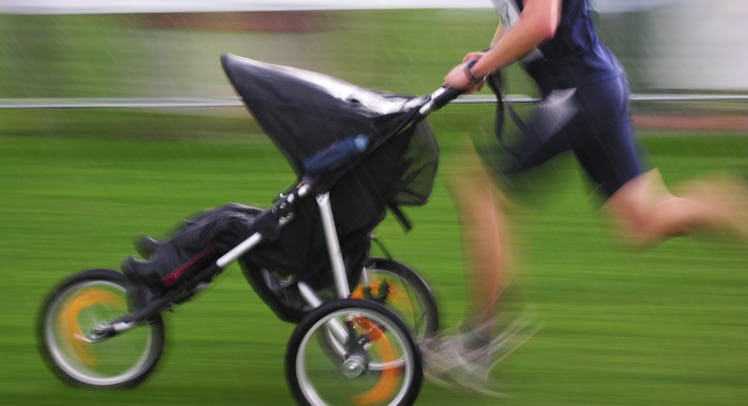Government Sues Britax Over B.O.B. Jogging Stroller Injuries
Citing 97 injuries since 2012, the government wants Britax to recall 493,000 strollers. The company refuses.

The U.S government thinks B.O.B. jogging strollers are dangerous and should be recalled. Britax Child Safety, the UK-based company that makes the popular strollers, disagrees. Citing user error ⏤ rather than any dangerous design defect in the front wheel ⏤ for the 200 complaints and 97 injuries that have been reported since 2012, the company is standing by its strollers and refusing to issue a voluntary recall. Last week, the disagreement came to a head when the U.S. Consumer Product Safety Commission (CPSC), the independent agency responsible for protecting U.S. consumers from dangerous products, sued Britax to force a recall.
At the center of the administrative complaint is the B.O.B.’s removable front swivel wheel, which uses a quick-release lock to attach to the frame. According to the CPSC: “When the quick release fails to secure the front wheel to the fork, the front wheel can suddenly detach during use.” And if the wheel pops off unexpectedly, the fork can dig into the ground, flip the stroller, and cause serious injury to both the child and adult operator. An even bigger problem, says the CPSC, is that the strollers can still be used even if the front wheel lock fails to engage.
According to the complaint: “Since January 2012, approximately 200 consumers have reported front wheel detachments while using the stroller, resulting in at least 97 injuries to children and adult consumers. Children have suffered injuries including a concussion, injuries to the head and face requiring stitches, dental injuries, contusions, and abrasions. Adults have sustained injuries including torn labrum, fractured bones and torn ligaments, contusions and abrasions.”
The CPSC believes the quick-release lock contains a design flaw that “presents a substantial product hazard” and wants Britax to “stop distributing various models of the strollers, notify the public of the defect, and offer consumers a remedy which may include a repair, replacement, or refund as plead in the complaint.”
Britax adamantly disagrees and has been staunch in the defense of both its safety standards and wheel-lock design. Customer error, they say, is to blame for any injuries that were incurred as a result of a detached wheel. “Front wheel detachments are not due to any defect in the product design,” the company wrote in a released statement, “they involve an improperly secured quick release mechanism and/or jogging with the swivel wheel unlocked.” According to the statement:
Today, BOB Gear by Britax announced that it declined the CPSC’s request to recall BOB jogging strollers in the U.S. made before September 2015. There is no defect in these products. They are safe when used as instructed. The quick release, which is used to secure the removable front wheel to the frame, is a widely-used feature. It has a history stretching back decades – first in bicycles and then in strollers. While we respect the CPSC and its mission, we cannot agree to recall a product that is not defective.
Should the CPSC’s lawsuit prevail, the recall would affect 493,000 single and double-occupant B.O.B. jogging strollers sold between December 2011 through September 2015, including the following seventeen models: Ironman, Ironman Duallie, Revolution, Revolution CE, Revolution Flex, Revolution Flex Duallie, Revolution Pro, Revolution Pro Duallie, Revolution SE, Revolution SE Demo, Revolution SE Duallie, Revolution SE Duallie Plus, Revolution SE Plus, Sport Utility Stroller, Stroller Strides, Stroller Strides Duallie and SUS Duallie.
Until a judge rules, however, B.O.B owners are being encouraged by the company to review user guides and instructional videos at www.bobgear.com, or contact the customer care at 888-427-4829, should they have any questions. “At BOB Gear, safety is at our core. Everything we do is driven with a focus on a commitment to safety,” said Sarah Tilton, Director, Consumer Advocacy. “Our consumers are well-informed when it comes to the products they buy, and we trust them to use the product correctly.”
This article was originally published on